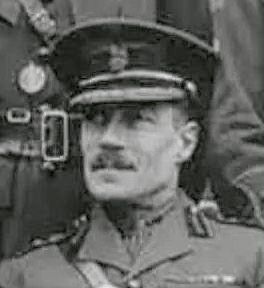Vernon Kell facts for kids
Quick facts for kids Major GeneralSir Vernon Kell KCMG, KBE, CB |
|
|---|---|
| 'K' | |
 |
|
| Allegiance | United Kingdom |
| Service | MI5 |
| Active | 1909–1940 |
| Rank | Director of MI5 |
|
|
|
| Born | 21 November 1873 Great Yarmouth |
| Died | 27 March 1942 (aged 68) |
| Nationality | British |
| Occupation | Intelligence officer, soldier |
| Military career | |
| Allegiance | United Kingdom |
| Service/ |
British Army |
| Years of service | 1894–1939 |
| Rank | Major General |
| Unit | South Staffordshire Regiment |
| Battles/wars | Boxer Rebellion First World War |
| Awards | Knight Commander of the Order of St Michael and St George Knight Commander of the Order of the British Empire Companion of the Order of the Bath Officer of the Order of Leopold (Belgium) Officer of the Legion of Honour (France) Officer of the Order of Saints Maurice and Lazarus (Italy) |
Major General Sir Vernon George Waldegrave Kell was a British Army general. He is famous for founding and leading the British Security Service, known as MI5. People often called him K. He was a key figure in protecting Britain from spies and threats.
Contents
Early Life and Education
Vernon Kell was born in Great Yarmouth, Norfolk, in 1873. His father, Major Waldegrave Kell, was also a soldier. Vernon grew up in a military family.
Military Career
After finishing his studies at the Royal Military College, Sandhurst, Kell joined the South Staffordshire Regiment in 1894. He quickly showed a talent for languages. He could speak German, Italian, French, and Polish very well.
Service in China
In 1900, Kell went to China. He fought in the Boxer Rebellion, a conflict where Chinese people rebelled against foreign influence. While there, he learned Chinese and Russian. He also worked as a reporter for The Daily Telegraph. He was recognized for his good work in China.
Working for the War Office
After returning to London in 1902, Kell started working at the War Office. His job was to study information about Germany. People in Britain were worried about German spies. This led to the idea of creating a new spy agency.
Founding MI5
In 1909, Vernon Kell was chosen to help start a new secret service. This new agency was called the Secret Service Bureau. He worked with another officer, Mansfield Smith-Cumming. They decided to split the work. Kell would handle threats inside Britain. Cumming would deal with foreign threats.
MI5 and MI6
Their work soon became two separate departments. Kell's part became MI5, which protects Britain from dangers within the country. Cumming's part became MI6, which gathers information from other countries. This separation happened in 1910.
World War I Efforts
During the First World War, Kell led a special section of MI5 called MI5(g). This group focused on stopping Indian groups in Europe who were working against Britain. He worked closely with Scotland Yard's Special Branch. They successfully tracked down revolutionaries who were helping Germany.
After the Wars
Kell continued to lead MI5 for many years. He was in charge for over 30 years, which is longer than anyone else has led a British government department in the 20th century.
Retirement and Recognition
In 1938, Kell reached retirement age. However, he was asked to stay on because another war was coming. In 1940, during Winston Churchill's time as Prime Minister, Kell was asked to step down. He was recognized for his long service. He received the honor of Knight Commander of the Order of St Michael and St George (KCMG) before he passed away in 1942.
Awards and Honors
Vernon Kell received several important awards for his service:
British Awards
International Awards
- Officer of the Order of Leopold (Belgium)
- Officer of the Légion d'honneur (France)
- Officer of the Order of Saints Maurice and Lazarus (Italy)
In Popular Culture
Vernon Kell's story has inspired several books and radio shows:
- He was a character in a radio show based on Arthur Conan Doyle's His Last Bow.
- He appears in the graphic novel series Suffrajitsu: Mrs. Pankhurst's Amazons. In this story, he helps a secret group of bodyguards.
- He is mentioned in Dennis Wheatley's novel The Second Seal.
- He is part of the story in Bill Aitken's novel Blackest of Lies.
See also
- James Edward Edmonds
- Sir Mansfield Smith-Cumming
- Sidney Reilly
- Sir Robert Bruce Lockhart
- William Melville

